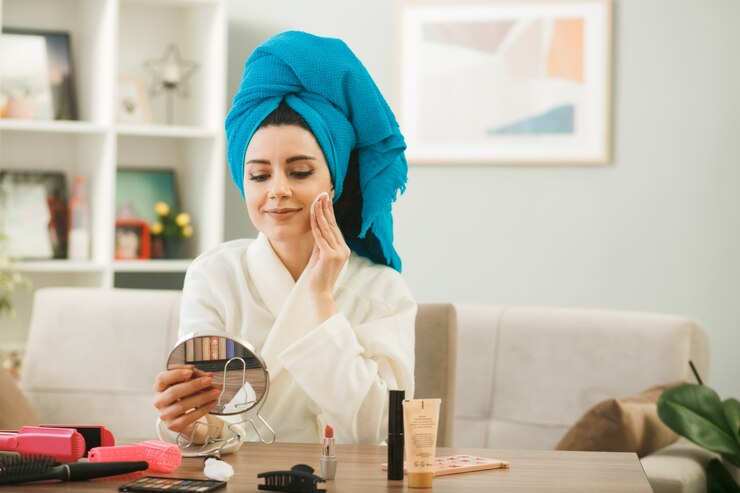Introduction to Skincare
Skincare routines for beginners goes beyond mere cosmetic enhancement; it is a proactive approach to promoting skin health and preventing premature aging. Understanding the basics of skincare sets a strong foundation for achieving your desired results.
Understanding Skin Types and it’s Protections
Before diving into skincare products, it’s crucial to identify your skin type. Skin can be classified into various categories such as oily, dry, combination, or sensitive. Knowing your skin type enables you to select products tailored to your specific needs.
Understanding Skin Types
Skin types vary from person to person and can change over time due to factors like age, hormones, and environmental influences. The main skin types include:
- Oily Skin: Characterized by excess sebum production, oily skin is prone to acne and can appear shiny or greasy.
- Dry Skin: Lacks moisture and may feel tight or flaky. Dry skin is often sensitive and prone to fine lines and wrinkles.
- Combination Skin: Combination skin exhibits characteristics of both oily and dry skin, with oiliness in the T-zone (forehead, nose, and chin) and dryness in other areas.
- Sensitive Skin: Sensitive skin is easily irritated by environmental factors, fragrances, and certain skincare ingredients.
Identifying your skin type is crucial for selecting appropriate skincare products and creating a personalized routine that addresses your skin’s specific needs.
Building a Basic Skincare Routine
A basic skincare routine consists of three essential steps:
- Cleansing: Cleansing removes dirt, oil, and impurities from the skin’s surface, preventing breakouts and congestion.
- Toning: Toners help balance the skin’s pH levels, tighten pores, and prepare the skin to better absorb subsequent skincare products.
- Moisturizing: Moisturizers hydrate the skin, lock in moisture, and create a protective barrier against environmental aggressors.
Choosing the Right Products
Selecting the right skincare products involves considering factors such as skin type, concerns, ingredients, and personal preferences. Opt for products formulated with gentle, non-comedogenic ingredients that address your specific skincare needs without causing irritation or clogging pores.
Additional Skincare Practices
In addition to the core routine, incorporating exfoliation, masks, and serums into your skincare regimen can provide targeted treatment for specific concerns such as dullness, uneven texture, or hyperpigmentation. Exfoliants remove dead skin cells, masks
Building a Basic Skincare Routine
A basic skincare routine comprises three fundamental steps: cleansing, toning, and moisturizing. Cleansing removes impurities and excess oil, toning balances the skin’s pH levels, and moisturizing hydrates and nourishes the skin.
Choosing the Right Products
Selecting the right skincare products can be overwhelming, given the myriad of options available in the market. Look for gentle cleansers, alcohol-free toners, non-comedogenic moisturizers, and broad-spectrum sunscreens to protect your skin from harmful UV rays.
Additional Skincare Practices
In addition to the core routine, incorporating exfoliation, masks, and serums can address specific skincare concerns and enhance the overall health of your skin.
Daily Skincare Habits
Simple habits like staying hydrated, maintaining a balanced diet, and getting adequate sleep complement your skincare regimen and contribute to vibrant and glowing skin.
Dealing with Common Skincare Issues
Acne, dryness, and sensitivity are common skincare concerns that can be effectively managed with the right products and techniques.
The Role of Consistency in Skincare
Consistency is key to achieving visible results with your skincare routine. Establishing a consistent regimen and adhering to it diligently yield long-term benefits for your skin.
Adapting Skincare Routine for Different Seasons
Adjusting your skincare routine according to seasonal changes helps address specific skin needs and combat environmental stressors.
Understanding Ingredients
Familiarize yourself with key skincare ingredients that target your concerns and avoid harmful additives that may irritate or sensit…
FAQs (Frequently Asked Questions)
- How soon can I expect to see results from my skincare routine?
Results vary depending on individual skin types and concerns. With consistent use, noticeable improvements can typically be seen within a few weeks.
- Can I skip certain steps in my skincare routine if I’m short on time?
While consistency is important, you can simplify your routine by prioritizing the essentials: cleansing, moisturizing, and sunscreen application.
- Is it necessary to use separate products for day and night skincare routines?
Day and night skincare routines serve different purposes. Daytime focuses on protection and hydration, while nighttime emphasizes repair and renewal.
- How do I know if a skincare product is suitable for my skin type?
Look for products labeled specifically for your skin type and consider patch testing new products to assess compatibility and avoid adverse reactions.
- Can I over-exfoliate my skin?
Over-exfoliation can compromise the skin’s barrier function and lead to irritation and sensitivity. Limit exfoliation to 2-3 times per week, depending on your skin’s tolerance levels.
Conclusion
Embarking on a skincare journey can be both rewarding and transformative. By understanding your skin’s unique needs and adopting a tailored skincare routine, you can nurture your skin and unveil its natural radiance. Remember, consistency, patience, and self-care are the cornerstones of healthy and beautiful skin.


